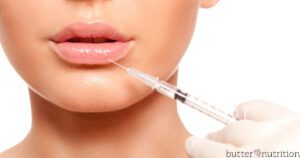 Hair loss comes up often with my female clients and it's also something I experienced personally over a decade ago. It's incredibly emotional and personal making it difficult to talk about.
Hair loss comes up often with my female clients and it's also something I experienced personally over a decade ago. It's incredibly emotional and personal making it difficult to talk about.
Before we dive into these, first, always check the side effects of any medications you are taking or started taking around the time you noticed the hair loss. Medication use is a very common cause of hair loss. If you've already checked your medication list and asked your doctor about it, move on to the next part of the article.
Here's six quick reasons for hair loss to consider:
1. Iron Deficiency
Iron is one of those super-important minerals that you don't want to have too much or too little of. Having too little iron is also well-known cause of hair loss. [1]
Iron deficiency is more common in women due to the loss of iron from childbearing and menstruation, but can also be caused by eating disorders, vegan or vegetarian diets, gut absorption issues (such as low stomach acid), and donating blood too frequently.
Checking in with your doctor or dermatologist to request an iron panel that includes ferritin (iron stores in the body) is often a good place to start when it comes to finding the source of your hair loss.
Many doctors agree that ferritin should be above 40-50 ng/mL to stop hair loss, and over 70 ng/mL for healthy hair regrowth. This is part of the reason blood donation can cause hair loss if you're not monitoring your ferritin levels - each blood donation can drop your level significantly, about 30 ng/ml.
You can request an iron panel and ferritin through your doctor or through a consultation that adds on blood work.
2. Zinc Deficiency
Although the connection between zinc and hair loss is not completely clear, there is often a correlation found between hair loss and those with low zinc levels.
You can find zinc abundantly in animal proteins and some plant foods, although the bioavailability of zinc is greater in animal proteins. This puts vegans and vegetarians at a greater risk of deficiency.
I keep tabs on my clients' zinc levels using Hair Analysis and plasma zinc.
3. Over-supplementation
In American culture it's common to think that more nutrients, often in supplement form, is better. But that couldn't be further from the truth, especially when it comes to hair loss.
According to a 2017 article in the Dermatology Practical & Conceptual Journal, "Over-supplementation of certain nutrients, including selenium, Vitamin A, and Vitamin E, has actually been linked to hair loss. It is therefore surprising that the best-selling hair supplement on Amazon.com contains both vitamin A and vitamin E, while the next contains selenium, vitamin A, and vitamin E." [3]
Over-supplementation often happens unknowingly, as it's not rare to see clients taking laundry lists of supplements, which often contain many of the same vitamins and/or minerals. Before you know it, you're getting the same nutrients from several supplements on top of what you are getting from your food. Risk of nutrient overload beyond that that can be seen by the naked eye include: liver toxicity, inflammation, stomach upset, and bloating. [3] This is especially true when it comes to fat soluble vitamins (A, D, E and K). Fat soluble vitamins are not easily excreted in urine like water soluble vitamins, and are instead stored in the body.
The conclusion here is clear. There are certain nutrients that in deficiency states only can support slowing hair loss (namely zinc, iron, and selenium) but those same nutrients if supplemented in absence of deficiency could pose no benefit and even cause hair loss (especially vitamin A). To avoid the risk of over-supplementation and it's adverse effects, supplement only when needed in cases of proven deficiency and only long enough to correct the imbalance. This includes multivitamins!
4. Hypothyroidism
Low thyroid function is common can be a large contributor to hair loss, especially if the hypothyroidism is severe.
Hypothyroidism in short means that your body is not producing enough thyroid hormone. It can be caused by the autoimmune condition Hashimoto's thyroiditis, as well as self-induced through dieting, over-exercising and other means of overextending your body.
Hair follicles are a direct target of thyroid hormones, and have modulating effects on hair follicle cycling and pigmentation. [2]
From the nutritional therapy perspective, it's essential to make sure your body is getting all the macronutrients it needs (protein, carbs + fats), as well as all the raw materials it needs (specifically calcium and potassium) to support thyroid function as well as your body and its natural desire for health.
5. Protein Malnutrition
So much as a dramatic drop in protein intake can be enough to cause telogen effluvium (TE). TE is a condition that causes the roots of the hair to prematurely go into the resting state and is typically caused by stress or some sort of shock to your system. TE can cause as much as 70% of scalp hairs to shed two months following the trigger event as the resting hair is eventually pushed out of the scalp. [4]
Find out more about how to meet your protein needs here.
6. Stress
Stress is by far one of the biggest sources of hair loss I've seen in my nutrition practice. The stress could come from a variety of sources, but is not limited to dieting, calorie restriction, sudden weight loss, over-exercising, menopause, childbirth, severe emotion stress (divorce, death of a family member, illness), and eating disorders.
All of these stressors can also trigger TE sending a large amount of your scalp hair into hibernation followed by the shedding cycle.
7. Hormonal Issues (like estrogen dominance)
Hormonal imbalance can trigger hair loss in a big way. The most common that I see is that caused by estrogen dominance where estrogen levels are too high relative to progesterone levels. Estrogen dominance is commonly caused by imbalances in the gut as guy dysbiosis can cause the re-circulation of estrogens. This is because certain types of gut bacteria produce beta-glucuronidase enzymes that can re-activate (or deconjugate) estrogens that were already detoxified (conjugated) and on their way out of the body. Decreasing levels of beta-glucuronidase enzyme producing bacteria in your gut is key to stopping the cycle of estrogen recirculation. Gut testing is the best way to find out if estrogen dominance is to blame for your hair loss.
I hope this helps give you a few routes to explore as you get to the root of your own hair loss. The more you can learn and discover about your own body, the better you can reach your most enjoyable levels of health!
Have you experienced hair loss? Please share in the comments!
PIN IT:
References:
[1] https://www.ncbi.nlm.nih.gov/pmc/articles/PMC5315033/
[2] https://www.ncbi.nlm.nih.gov/pubmed/18728176
[3] https://elemental.medium.com/the-problem-with-supplements-e0f5f2fb1d74
[4] https://www.aocd.org/page/telogeneffluviumha







Join the Conversation